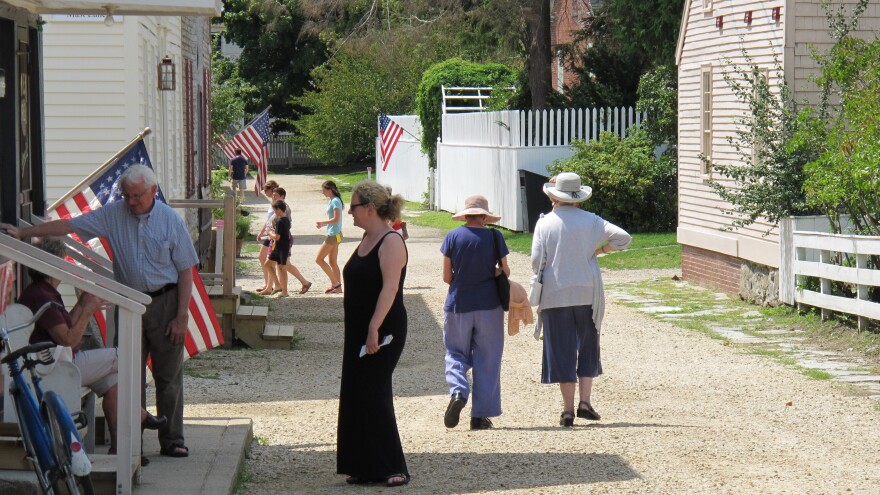All it takes to enter a time warp in New Hampshire is $15 and a summer afternoon. Spanning more than 250 years of American history, Strawbery Banke is the oldest neighborhood in the state's oldest city, Portsmouth.
It's kind of like Virginia's Colonial Williamsburg — lite. Stationed inside many of the 37 homes are re-enactors in different period garb. Inside a hulking white house, it's 1872.

Typically, Strawbery Banke's visitors have been of the school group and tour bus variety. But when the economy went downhill, museum staffers started thinking about drawing longer-term guests: actual contemporary tenants.
"It's fair to say that we have always struggled to find a financial model that sustains us adequately ... and we've never had an income stream that was consistent," says Rodney Rowland, Strawbery Banke's facilities director.
He says the historic houses' upper levels are usually storage space. So it made sense to turn these extra rooms into extra revenue: modern apartments and office spaces. All told, Rowland hopes this move will add $300,000 to the bottom line.
Inside a bright yellow colonial house, a couple of tourists wander through a quiet woodcarving exhibit. They stare intently at a carved eagle and various tools kept behind glass. What they don't know — until he tromps downstairs — is that 60-year-old Tom Richter lives upstairs.
With his easy grin, bare feet, cut-off khakis and baggy T-shirt, he looks kind of like he walked out of a Jimmy Buffett song.
At the top of the old wooden staircase sits an apartment that's not much bigger than a college dorm. To the right, there's a kitchenette and a small bathroom.
Richter's day job is working as a project manager for the city's public works department. On his time off, he's a musician. He's working on a set of folk songs about Portsmouth right now, and he moved to Strawbery Banke for inspiration.

As long as he can have his window air-conditioner — discreetly placed in a back window so tourists aren't likely to see — and room for his banjo, he's pretty much happy. But there was one requirement he followed up on quickly.
"There was a rule that said, 'No alcohol,' and my hand automatically reached for the phone," Richter says. "I called Rodney, and he clarified, 'No, you can have alcohol upstairs, you just can't maraud around the grounds while we're open.' So all is well."
Eva Boice lives next door to Richter over the woodcarving exhibit. Mysterious holes in floorboards and swatches of paint layers exposed on her door during renovation are all part of the charm.
"I feel that there was either the hand of God or fate in me being here, because this is a fantastically unique situation," she says.
Overall, Boice says Strawbery Banke has done a good job of preserving its living-history illusion downstairs while catering to its modern tenants' needs. But every now and then, something happens. Take the washer and dryer, which are carefully hidden behind a cupboard door downstairs, just off from the exhibit space.
"One of the kids stumbled into it one day, and I heard him say, 'Oh! They had these back then, too?' " she says.
Besides the occasional appliance sighting, the only other hint of present-day New Hampshire life over this exhibit might just be a few bars of Richter's music.

This story is part of the StateImpact New Hampshire project. StateImpact is a collaboration between NPR and member stations examining the effect of state policy on people's lives.
Copyright 2012 NHPR




